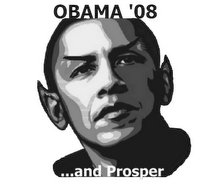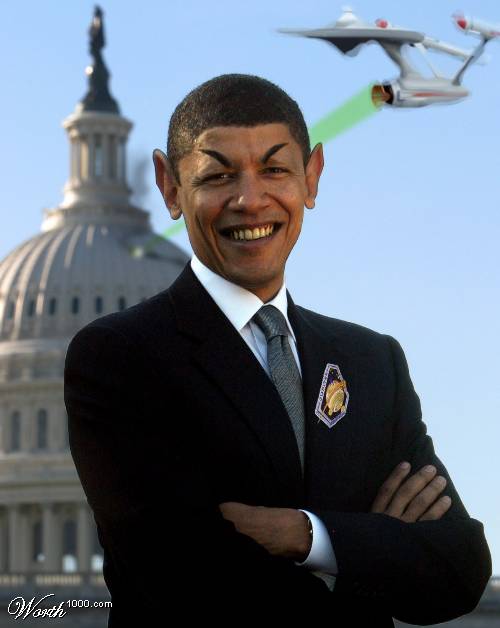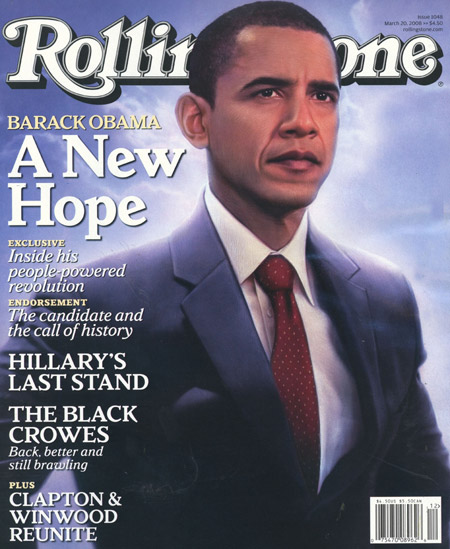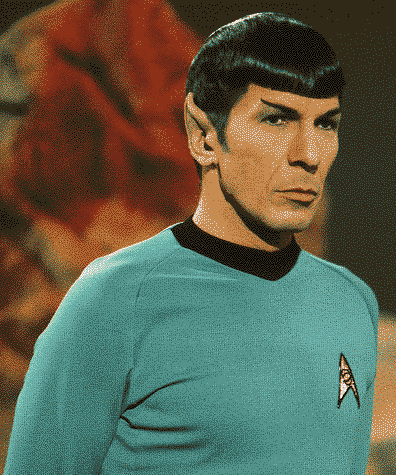Is Obama a Secret Vulcan?
/The following is adapted from my opening remarks at the Future of Civic Media conference we hosted at MIT last week. A few weeks ago, I was interviewed by National Public Radio about Star Trek's Mr. Spock for their "In Character" series. Midway through the interview, the reporter asked me a question which in retrospect was an obvious one but which I had never really given much thought before: What contemporary figure has the same qualities as Mr. Spock?
The fan boy in me immediately went searching through contemporary science fiction television. I considered and then discarded Gaius Baltar from Battlestar Galactica as probably too obscure to make sense to an NPR audience. I thought about Syler from Heroes as another prospect, no doubt influenced by the casting of Zachary Quinto to play Spock for the forthcoming Star Trek prequel movie. In both cases, you had characters who are defined through their otherworldly intelligence. Syler, like Spock, is someone who can bitch slap you with his brain. And in both cases, there is a deep distrust of that intelligence and their rationality is seen not as impartial but as self-absorbed and antisocial.
But, then, my mind went in a very different direction and before I quite knew what I was saying, I found myself talking about Barack Obama. Now, I grant you, I've got Obama on the mind these days but hear me out.
At the time, my main point was that Spock was an explicitly mixed race character on American television at a time when most programs hadn't come to grips with identity politics. Star Trek's Spock was born of a human mother and a Vulcan father. Throughout the course of the series and especially in the feature films, he struggles to make his peace with the conflicting pulls on his identity. And because he is a man literally of two worlds, he is seen as being capable of translating between Terrans and many of the other races they encounter as they "boldly go where no man [one] has gone before."
A similar construction of multiracial identity has taken shape around Obama who has sought to construct himself as not only post-partisan but also post-racial. It's striking what a high percentage of media coverage of Obama describes him as African-American, despite the fact that he has a white mother. Early on, there was a lot of press about whether he would be "black enough" to gain the support of African-American voters, just as the press was quick to remind us that Toni Morrison had once described Bill Clinton as the first Black President (a phrase now totally removed from its context). Now, the press is trying hard to get us worried about whether white voters are ready to support an African-American candidate for president. But, if you look at how Obama has constructed himself, it is as someone at home with both blacks and whites, someone whose mixed racial background has forced him to become a cultural translator, and thus he is someone who can help America work through some of its racial divides. This was very much a subtext in his speech about race in the wake of the Rev. Wright controversy and it is precisely this sense of Obama as a man of two worlds which was called into crisis by those videos.
Listen to the speech which Amanda, Spock's mother, delivers in the NPR broadcast about being beaten up as a child because the others don't think he's Vulcan enough and you will hear echoes there of some of the stories we've heard about Obama's struggle to figure out who he was growing up.
I've been surprised by how quickly the blogosphere picked up on the Spock/Obama comparison. Almost immediately, I started to see people construct graphics around the Spock/Obama theme, which clearly resonated with people other than myself.

This image predates the interview and was submitted to a contest to depict what would happen if Trekkers ruled the world, so I am certainly not the only one to see a connection.

I have to say I would have chosen a picture where Obama wasn't smiling. A smiling Vulcan is just plain creepy!
Take a look at these two photographs and see if you don't start to think that Spock and Obama were separated at birth.

After all, editorial cartoonists are already starting to play up Obama's over-sized ears as the feature they can get away with caricaturing, because it wasn't part of the minstrel show stereotypes through which racists have historically constructed images of African-Americans. Add to this the long and angular shape of his face and the way he turns his face slightly upward as he speaks and you have someone who looks like he could have been born a Vulcan and had an "ear job."
But from there, we can see more complex analogies: for example, might we see his search for his spiritual identity in an Afro-centric church as a parallel to Spock's return to Vulcan to participate in the purifying ritual of Kolinahr as a way of reclaiming his roots in his father's culture? Is there any question that McCoy sees Spock as an "elitist," because he is frightened by his intelligence and because he is uncomfortable making small talk? And surely we can see Obama as the living embodiment of the Vulcan philosophy of IDIC ("Infinite Diversity in Infinite Combination"?)
Gene Roddenberry, the producer behind the classic Star Trek series, consciously modeled James T. Kirk (JTK) after the qualities that he admired in John F. Kennedy (JFK) and that he saw the series as a way of keeping the ideal of "Camelot" alive during the more cynical LBJ era. Kirk is the youngest captain in the history of Star Trek, much as Kennedy first burst of the national consciousness as a charismatic, courageous, P.T. Boat captain and was at the time the youngest person elected as president. The original Star Fleet was modeled in part on the Peace Corps and was also clearly intended to build on growing public interest in NASA's plans for putting a man on the moon, both aspects of the JFK agenda. And there's some possibility that the "Final Frontier" was a self conscious reworking of JFK's "New Frontier." Much as Kennedy's foreign policy sought to win over unaligned developing nations through "weapons of peace" in a cold war context, Classic Trek sees Star Fleet as doing ideological battle with the Romulan-Klingon Alliance and trying to hold onto the loyalty of unaligned and developing planets. So, in so far as people are reading Obama in relation to our shared myths about the Kennedy era, then it also makes sense to think of his campaign through the lens of Star Trek.
For me, the connection makes sense on a somewhat deeper and more personal level. I am a first generation Star Trek fan and I've long argued that many of my deepest political convictions - especially those surrounding equality and diversity - emerged from my experience of watching the program as a young man growing up in Atlanta during the Civil Rights era. In many ways, my commitments to social justice was shaped in reality by Martin Luther King and in fantasy by Star Trek. Star Trek did this not through the explicit and heavy handed social commentary in episodes like "Let This Be Your Last Battlefield" which featured aliens who were half white and half black (in the most literal sense) but because of the idealized image of a multiracial community depicted on the series. Later generations have looked upon the figure of Uhura as tokenism, pointing out rightly that she never got to do anything more than tell the captain that "hailing frequencies" were open. Yet, Nichols has long told the story of talking with Martin Luther King during a civil rights march and being told that her mere presence on the Bridge was a visual reminder that his dream might come true in the future. Star Trek featured the first inter-racial kiss on American television. My colleague, Shigeru Miyagawa, tells the story of growing up in Alabama and having Sulu be the only Asian-American character he saw on American television. And then there's Chekov, a Russian character on American television, in the midst of the Cold War - a friendly acknowledgement of the Soviet contributions to space exploration.
So, we should read Spock in this context - as one more example of the ability of the Enterprise crew to embrace diversity. The program often fell short of its ideals, then and in subsequent decades, and it is easy to find points to criticize Star Trek's racial politics. For a good discussion of these issues, check out Daniel Bernardi's Star Trek and History: Race-Ing Toward a White Future. But for me and many others of my generation, it held up a set of ideals; it encouraged us to imagine a more utopian society which escaped the limitations which I saw all around me growing up in a South which was actively struggling with the legacy of segregation. And I have found through that years that this idealized image of a multiracial and multicultural, hell, multiplanetary community, was part of what Star Trek meant to a large number of first generation fans of the series. For more discussion of this theme, check out my essay on the Gaylaxians movement, originally in Science Fiction Audiences, later reprinted in Fans, Bloggers, and Gamers.
In its own small way, Star Trek and Spock may have helped to prepare the way for Obama's victory in the Democratic primaries, helping us to imagine a different set of relationships between the races. Nowhere was this social utopian vision more fully expressed than the "great friendship" between Kirk and Spock and so we can see some legacy of this theme of acceptance across racial boundaries emerging through the slash fan fiction which became one of the major legacies of early Star Trek fan culture. The other "non-white" characters may have been more suggestions than fully developed figures - at least on the original series - but Spock was someone we got to know and care about because, not despite, his differences. This is one reason why so many fans of my generation were upset when Kirk praises Spock for being "the most human" person he has ever known during his funeral eulogy in Star Trek: The Wrath of Khan. Can you imagine the uproar if someone praised Obana's "whiteness"?
Of course, Roddenberry's embrace of science fiction as a vehicle for the utopian imagination was itself informed by more than a century of science fiction being deployed as a political tool - going back to the novels of H.G. Wells and Edward Bellamy, taking shape around 1950s novels like Space Merchants and City, and extending into the feminist science fiction of the 1960s, all of which shaped Star Trek in one way or another. Given this tradition, it was scarcely a surprise when I stumbled onto a whole line of SF-themed shirts supporting Obama, including not only one linking him with Spock, but also those connecting him with Buffy the Vampire Slayer, Battlestar Galactica, and The Matrix. And surely, we can see the political uses of science fiction when we see how the Anonymous movement is deploying Guy Fawlkes masks clearly inspired by V for Vendetta. Or, for that matter, is it any accident that Rolling Stone describes Obama as "A New Hope," evoking the title of the original Star Wars film.
I wish I could say all of this flashed in my mind when I started babbling about Spock and Obama. In reality, I was improvising, but the more I've thought about it, the more helpful the analogy has become as a way of thinking about why Obama's candidacy has so sparked my imagination.
And, by the way, check out this video on Youtube from one of Leonard Nimoy's appearances at a science fiction convention in which he describes an encounter with none other than Barack Obama. So, Obama is not a "secret moslem," he's not a "secret vulcan," but he may be a secret Trekker! :-)


